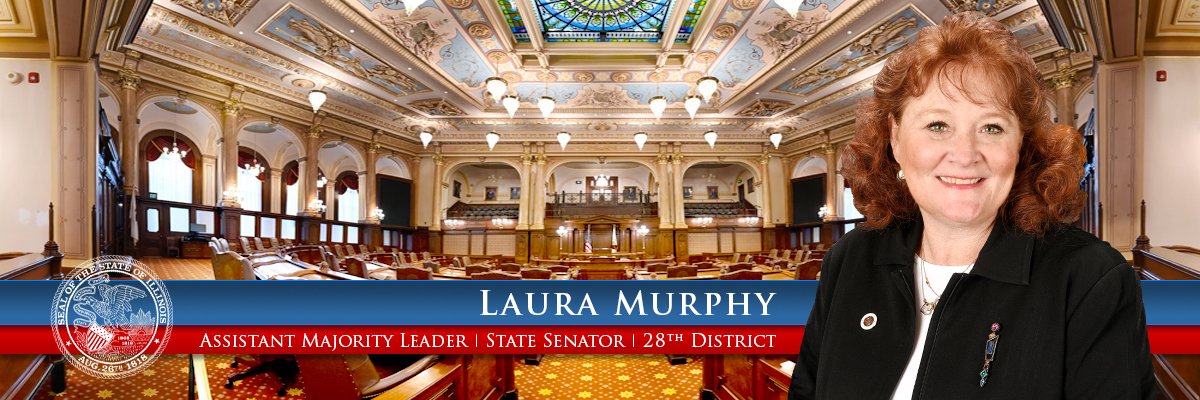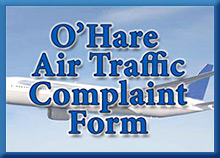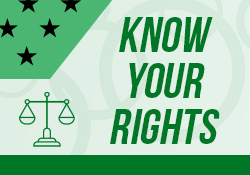Residents to see $3.5 million in improvements to Des Plaines River Trail, Murphy announces
- Details
 DES PLAINES – Pedestrians and bicyclists in Des Plaines will be able to enjoy safer access to a 55-mile trail running from the Wisconsin border down through central Cook County thanks to a combined $3.5 million investment in local infrastructure improvements, State Senator Laura Murphy (D-Des Plaines) announced.
DES PLAINES – Pedestrians and bicyclists in Des Plaines will be able to enjoy safer access to a 55-mile trail running from the Wisconsin border down through central Cook County thanks to a combined $3.5 million investment in local infrastructure improvements, State Senator Laura Murphy (D-Des Plaines) announced.
“The Des Plaines River Trail is one of the area’s most popular routes for families and commuters,” Murphy said. “These improvements will make it safer and easier for residents to enjoy miles of natural beauty.”
The City of Des Plaines will receive $1.9 million to create a sidepath, for use by both pedestrians and bicyclists, along the north side of Oakton Street between Des Plaines River Road and the Des Plaines River Trail. The new route will offer commuters and recreational users in Des Plaines safer and more direct access to the trail.
An additional $1.6 million will make improvements to Segment 2 of the Des Plaines River Trail through Rosemont.
These improvements are funded through the Illinois Transportation Enhancement Program (ITEP), for which the Illinois Department of Transportation has selected 99 projects totaling $105.7 million. Projects receiving funding in this round of investment include biking and walking paths, trails, streetscape beautification, and other projects designed to encourage safe travel across the various modes of transportation at the local level.
Residents of the Northwest Suburbs will also see improvements to a number of other area trails for pedestrians and bicyclists through ITEP, including Clearmont Pedestrian Bridge over Salt Creek in Elk Grove Village and County Farm Road in Hanover Park.
“The new and improved Des Plaines River Trail will allow residents of Wisconsin, Lake County and Cook County to travel throughout the region without worrying about dangerous crossings, flooding and other obstacles,” Murphy said. “I’m excited to see these long-awaited projects take shape.”
Murphy: Hanover Park cyclists, pedestrians to enjoy safer travel following County Farm Road improvements
- Details
 DES PLAINES – Residents of Hanover Park will be able to spend time outdoors and stay connected to surrounding communities thanks to a $450,000 project extending the County Farm Road multi-use path, State Senator Laura Murphy (D-Des Plaines) announced.
DES PLAINES – Residents of Hanover Park will be able to spend time outdoors and stay connected to surrounding communities thanks to a $450,000 project extending the County Farm Road multi-use path, State Senator Laura Murphy (D-Des Plaines) announced.
“A well-rounded community infrastructure system offers a range of accessible transportation options, including walking and bike paths,” Murphy said. “These improvements will make it safer and easier for residents to take in all the natural beauty our area has to offer.”
The project will extend County Farm Road south from the Hanover Park Metra Station and make safety improvements along the route. The extended path will connect County Farm Road to an existing bike path that reaches Mallard Lake and Hawk Hollow forest preserves, giving cyclists and pedestrians easy access to a greater trail network.
These improvements are funded through the Illinois Transportation Enhancement Program (ITEP), for which the Illinois Department of Transportation has selected 99 projects totaling $105.7 million. Projects receiving funding in this round of investment include biking and walking paths, trails, streetscape beautification, and other projects designed to encourage safe travel across the various modes of transportation at the local level.
Residents of the Northwest Suburbs will also see improvements to a number of other area trails for pedestrians and bicyclists through ITEP, including Clearmont Pedestrian Bridge over Salt Creek in Elk Grove Village, Des Plaines River Trail in Rosemont and Oakton Street Sidepath in Des Plaines.
“Safe and well-maintained trails give residents, commuters and visitors the opportunity to get outside and enjoy nature,” Murphy said. “The new and improved County Farm Road will keep us connected with the environment and each other.”
Murphy receives first-ever Community Partnership Excellence Award from Des Plaines Chamber of Commerce & Industry
- Details
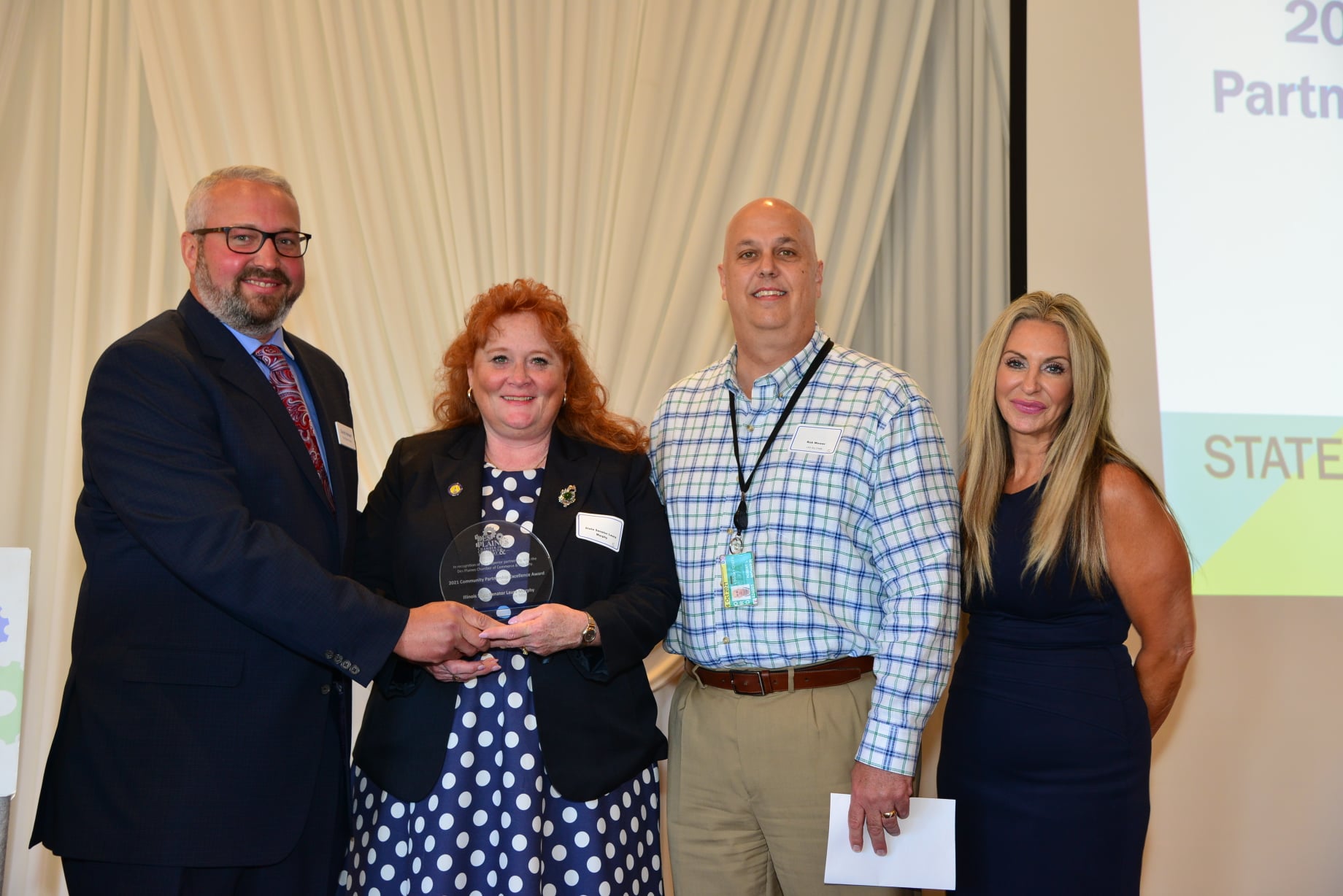 DES PLAINES – State Senator Laura Murphy (D-Des Plaines) was awarded the first-ever Des Plaines Chamber Community Partnership Excellence Award on Thursday in recognition of her service and dedication to the community and its businesses.
DES PLAINES – State Senator Laura Murphy (D-Des Plaines) was awarded the first-ever Des Plaines Chamber Community Partnership Excellence Award on Thursday in recognition of her service and dedication to the community and its businesses.
“It is the greatest pleasure and honor to continue to serve this community,” Murphy said at the ceremony. “The people in Des Plaines make this community the fabulous place it is. None of us do this work alone—it’s only because of the support of the residents that we’re able to do it.”
The Des Plaines Chamber of Commerce & Industry selected Murphy to receive the award because of her longtime efforts to improve pedestrian safety in the community, particularly along Touhy Avenue in Des Plaines.
Multiple pedestrians have been struck by oncoming vehicles along Touhy Avenue in recent years, resulting in two fatalities.
Both fatal accidents involved employees of the LSG SkyChefs facility located across Touhy Avenue from the Pace Suburban Bus stop. Formerly, LSG SkyChefs employees who took the bus were forced to cross seven lanes of heavy traffic to get to work.
Murphy acted swiftly in response to these accidents to prevent further tragedy, successfully securing $3 million for repairs and improvements to the road in 2019. She also worked with Pace and the Illinois Department of Transportation to make immediate changes to increase safety, including installing better lighting, lowering speed limits and moving the bus stop to a safer location to reduce Touhy Avenue crossings.
Murphy also sponsored Senate Bill 1791 this spring to require IDOT to conduct a traffic study following any fatal pedestrian accident on a state highway, which she hopes will help identify problem areas and find solutions. The legislation passed both houses of government and now awaits the governor’s signature.
“Senator Murphy has spent the last 20 years as an active member of the Des Plaines community,” said Andrea Biwer, the chamber’s executive director. “The senator has supported the Des Plaines Chamber as our partner and our friend through the years, and whenever we needed anything, her help and support helped get us through.”
Biwer spoke at the ceremony praising Murphy’s work on behalf of the Des Plaines business community, and Rob Mower, general manager of LSG SkyChefs, thanked the senator for her quick work and collaboration to improve safety for the community.
“I am so blessed with the honor to continue to serve you in the General Assembly,” Murphy said. “I look forward to continuing in that role.”
Murphy to host free community shred event June 26
- Details
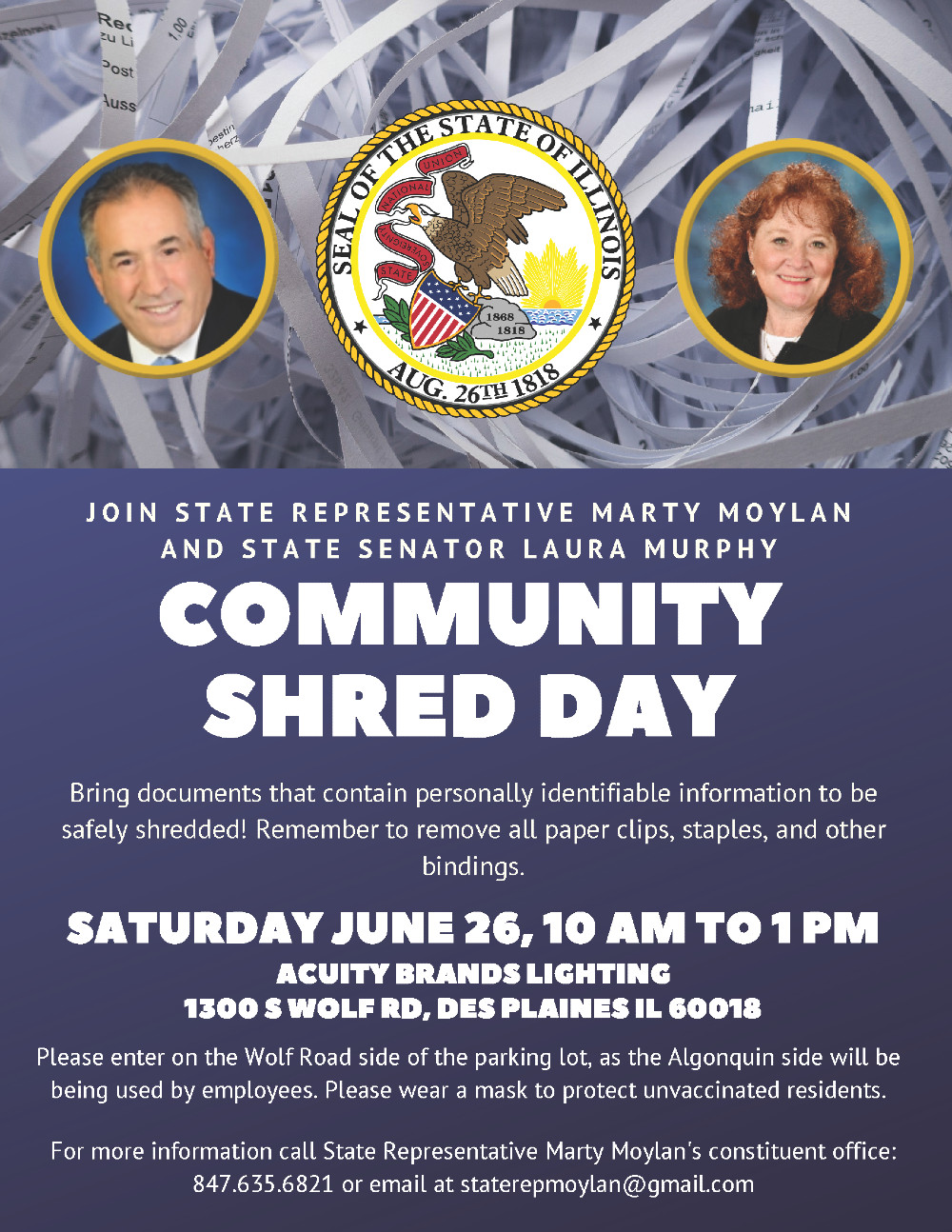 DES PLAINES – To help community members protect their personal information from fraudsters, State Senator Laura Murphy (D-Des Plaines) is hosting a community shred event on Saturday, June 26 from 10 a.m. to 1 p.m. in the parking lot of Acuity Brands Lighting, located at 1300 S. Wolf Rd. in Des Plaines.
DES PLAINES – To help community members protect their personal information from fraudsters, State Senator Laura Murphy (D-Des Plaines) is hosting a community shred event on Saturday, June 26 from 10 a.m. to 1 p.m. in the parking lot of Acuity Brands Lighting, located at 1300 S. Wolf Rd. in Des Plaines.
“One way we can all prevent fraud and identity theft is by securely disposing of sensitive personal documents,” Murphy said. “Take advantage of this free and convenient opportunity to help keep your information out of the wrong hands.”
At this free community event, residents can securely dispose of any sensitive or confidential documents, like bank statements, paid utility bills and receipts.
The event will take place in the parking lot on the Wolf Road side of Acuity Brands Lighting, formerly known as Juno Lighting Group.
All residents, including those who are vaccinated, are asked to continue to adhere to COVID-19 prevention measures at the event by wearing a mask and practicing social distancing for the safety of anyone still waiting to be vaccinated.
Murphy is hosting the event in partnership with State Representative Marty Moylan (D-Des Plaines).
“You can never be too careful when protecting yourself against financial fraud or identity theft which is why I strongly encourage any resident who has sensitive documents they need to get rid of to take advantage of this service,” Moylan said.
More Articles …
Page 50 of 137
